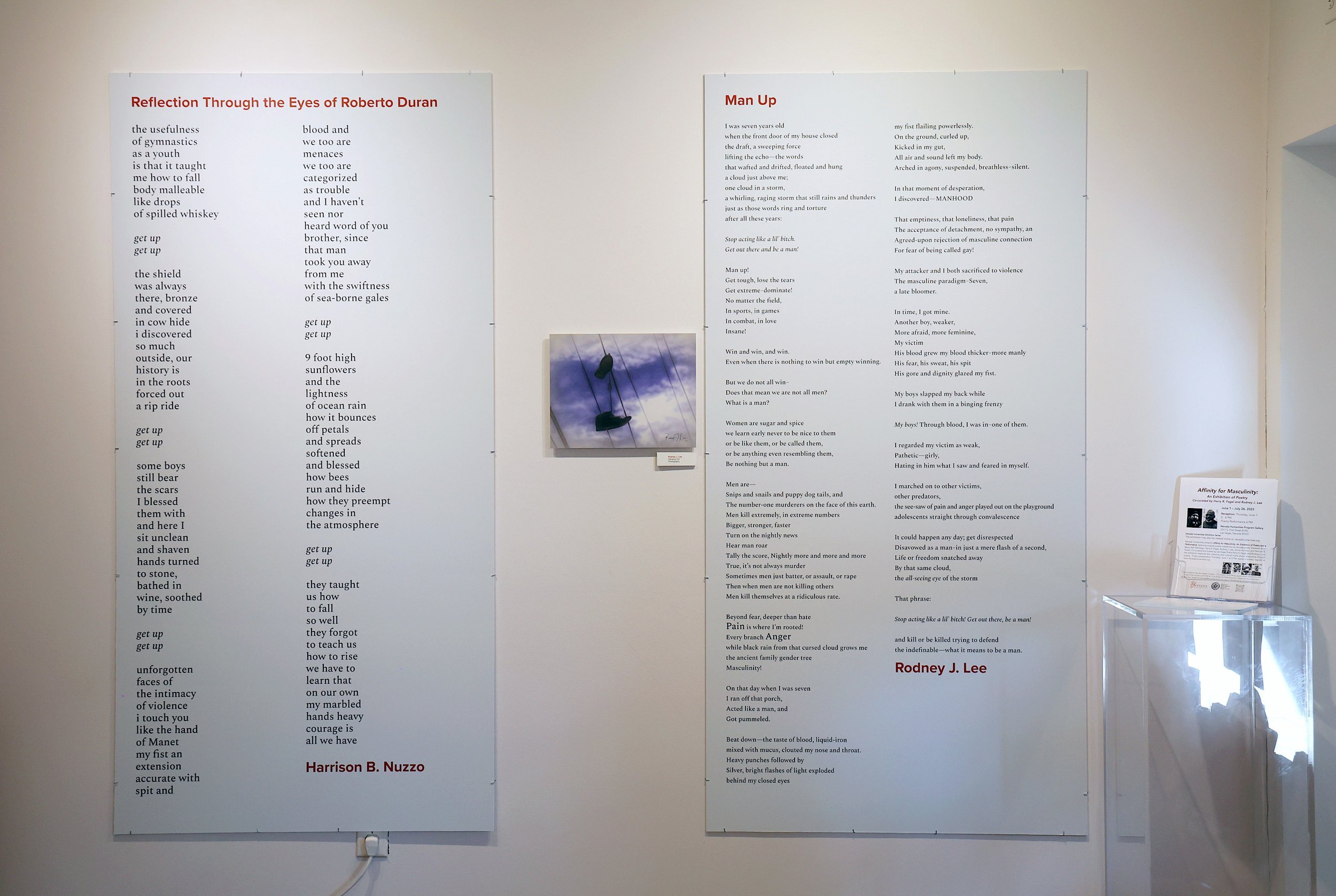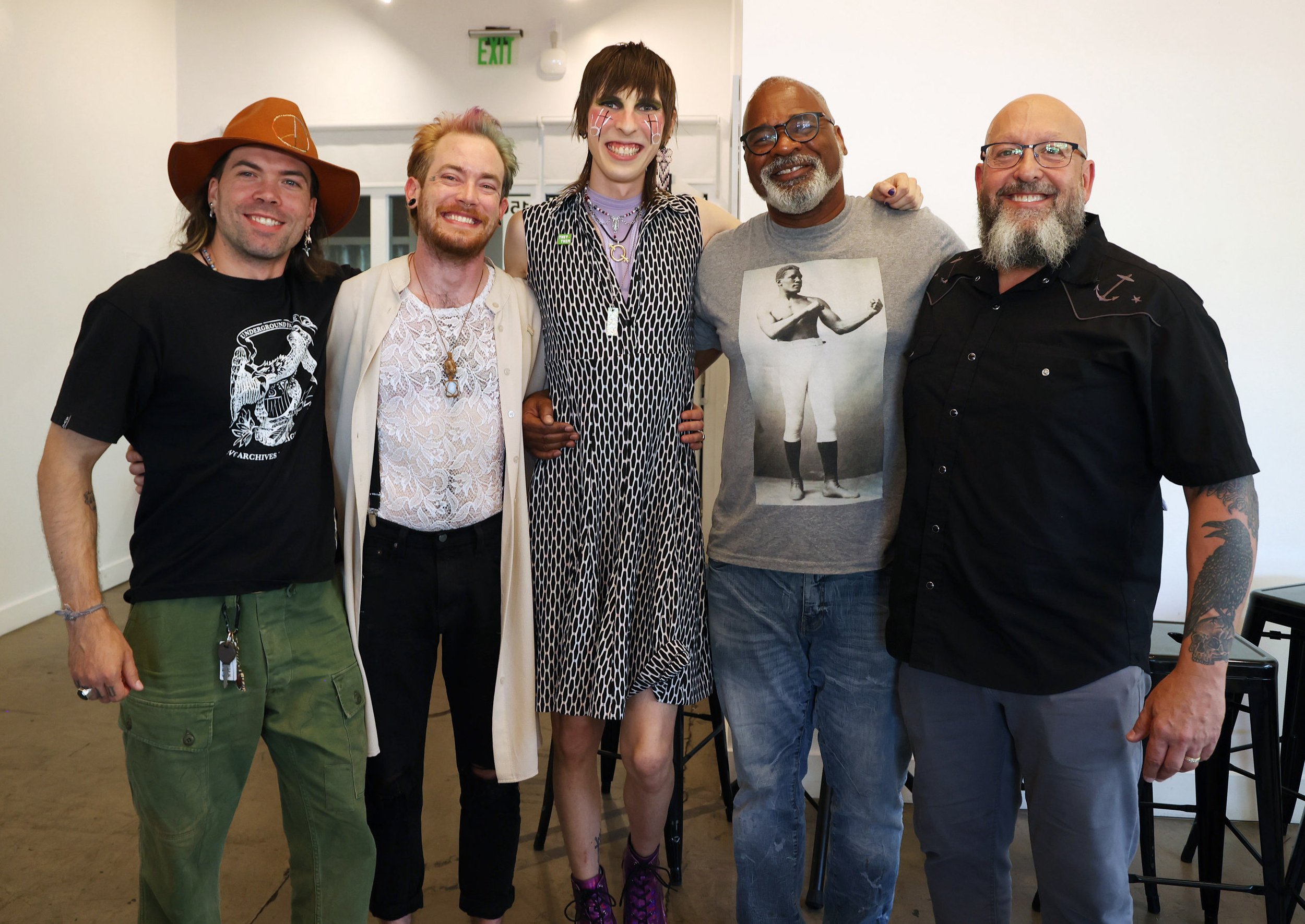3 Questions about Affinity for Masculinity: An Exhibition of Poetry with Curators Harry Fagel and Rodney J. Lee
Affinity for Masculinity exhibition poets from left to right: Harrison Nuzzo, Ash DelGrego, Elizabeth Allen Berry, Rodney J. Lee, and Harry Fagel.
By Harry Fagel and Rodney J. Lee
We asked Harry Fagel and Rodney J. Lee, poets and guest curators of the current Nevada Humanities Exhibition Series Affinity for Masculinity: An Exhibition of Poetry, to answer three questions about their inspiration for creating this exhibition and about their 30-year friendship.
Can you tell us how the work of the poets in this exhibition have provided a pathway for each of us to reflect on our concept of masculinity, and some of the ideas and experiences we may have to face?
Harry: The poets are from a very diverse background within their literary disciplines and life experiences. By choosing a multicultural group with varied degrees of formal education, and distinctly different challenges in their personal life experiences, we hoped to achieve a shifting prism of views on masculinity within our own culture, and within the unique space of each poet's view. I believe inclusivity is a driving factor behind my own personal philosophy of art in general, and it seems in the administration of funded art experiences, some voices don’t get heard, often because folks aren’t even aware they are there. This group of poets included an MFA in poetry, a teacher, a retired policeman, a master carpenter who lived in his van among other interesting challenges, an author running a successful open mic and, a self-made “Zine Queen.” I think the diversity of voices was a beginning to exploring the fascinating subject of masculinity and our cultural obsession with the same. I hope the success of this endeavor leads to more exploration using a variety of poetic sources!
Rodney: Masculinity is like fingerprints. Each of us expresses it, navigates it, and understands it from our own unique perspectives. The journey to identity for all of us, masculine or feminine, and all the various expressions in between, frames the human experience. It’s the classic hero’s journey with monsters and mentors and holy grails of truths. I think all of us in the project wanted to contribute our words to add to the never-ending story of the search for self.



How has your friendship and working together over 30 years influenced the development of your poetry and in sharing the value of poetry in the community?
Harry: Rodney and I started doing open mics together 30 years ago. We were selected as part of a group traveling to Portland to compete in National Poetry Slam. The experience of traveling together was the beginning of a lifelong friendship. I believe our voice in the poetry world of Las Vegas has grown as we have grown. Our maturity lends to the poetry a more rounded, informed voice. I know I feel my poetry has an impact, and I want the impact to serve the community. I think when Rodney and I share, and people listen, that is the beautiful relationship that creates thought and removes doubt. Seeing things differently is the point many times.
Rodney: Man, Harry and I are like mirrors of reflection for one another. We are foils. We are partners. We push and challenge one another to be our best no matter where we share words. Our relationship feels like a call and response across consciousness. We both work with the public in our professions from analogous and opposite ends. I’m a teacher; he was a cop. I help individuals get on the road of life. I try to arm them with critical thinking and the powers of rhetoric, analyses, and evaluation. Harry catches my former students when they fall off the acceptable social pathway. He provides them with opportunities for reflection and accountability. We both serve the public good, which comes out in our work. We see the same world from different perspectives. A great deal of the time, we say the same things and share the same experiences in two distinct styles. It’s been a great relationship. It’s pushed me to grow and be better.
Affinity for Masculinity exhibition.
Humanities often explore a variety of avenues to express the essence of an idea, or issue, in an effort to lead to a better understanding of complex issues within the human experience. What did you learn that you did not expect in creating the exhibition and working with these poets?
Harry: I learned a few new ideas working with this group of poets and particularly this theme. If I was to point out something that was most poignant, it was the sameness of many of our experiences at the approximate age of 7 years old. It seemed several of us had a traumatic experience at that age involving violence. I’m sure there’s science to support such a strange similarity, but certainly the art was a proof of sorts. After all we didn’t collaborate, each piece is its own microcosm into the views of the artist. Regardless of each person’s individual experiences and life, the similarities of the actual trauma that “burned in” was striking and unexpected.
Overall, I think we have barely scratched the surface on this incredibly complex theme, and I am looking forward to exploring it even more through my poetry and other actual collaborations with different artists. Tally-ho! We have much work to do.
Rodney: More than anything, I learned to listen. As a poet, we are often wrapped in our own words, style, and poems. When we listen, really listen to the perspective of others, the ground shifts beneath our feet. Hearing happens to us, but listening requires our active participation. Listening and talking to one another heal our division and allow us to be brave again. Poetry is a conversation. I heard a lot of fear, a lot of pain, a lot of struggle, a lot of triumphs, and jubilation. Like a chrysalis, we must struggle to break free from the shell that encases us. We struggle and stretch, and when we begin to understand, we show our wings. There were a lot of beautiful wings on display that evening of the show. I listened and learned I am not alone in trying to find my way through this maze of masculinity.
Affinity for Masculinity: An Exhibition of Poetry is open to the public for viewing by appointment only Tuesdays through Thursdays from 1 to 4 pm and until 9 pm the first Friday of the month for First Friday events at the Nevada Humanities Program Gallery, 1017 South 1st Street, #190 in Las Vegas. In-person viewing will close on March 29, 2023. Contact Bobbie Ann Howell at bahowell@nevadahumanities.org or 702-800-4670 to make a viewing appointment. This exhibition will remain viewable online.
Harry Fagel is a Nevada poet, a retired police captain, and the author of several books of poetry. He loves his wife and kids more than everything, and he probably loves you too. Visit his website at harryfagelpresents.com.
For almost four decades, Rodney J. Lee has been an active member of the poetry community in Las Vegas, working as both a poet and an educator. Words heal, and we need healing so he keeps writing.
All photos courtesy Nevada Humanities. Affinity for Masculinity exhibition curators Harry Fagel (left) and Rodney J. Lee (right).



